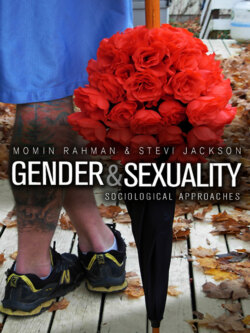Читать книгу Gender and Sexuality - Stevi Jackson - Страница 26
На сайте Литреса книга снята с продажи.
2.7 Gay Identity and Capitalism
ОглавлениеSocial historians such as Weeks (1989) and sociologists such as Adam (1985) and D’Emilio (1993) have demonstrated that the consolidation of gender divisions through industrialization and urbanization had the simultaneous effect of increasing the regulation and stigmatization of homosexuality. This is demonstrated in the growth in legal regulation, such as the Criminal Law Amendment of 1885 in Britain (Weeks, 1989), and in the greater emphasis on controlling men’s ‘natural’ lustfulness and channelling it towards monogamy and marriage. This concern was heightened by the opportunities for anonymous sexual encounters (paid or not) in the new urban spaces of work and leisure, which were now divided by gender, creating the potential for exclusive homosocial (same- gender) contacts. As homosocial environments at work and in leisure became the norm, the potential for homosexual encounters increased, creating a need for greater ideological policing of this potential. Homosexuality was increasingly identified and stigmatized as the binary opposite of heterosexual masculinity. The structural changes wrought by industrialization and modern rational capitalism were the context for the increasing cultural influence of sexology in categorizing ‘perversions’ of sexual behaviour into types of people (see Ch. 1.3). Strictly Marxist ideas that explain culture (or ideology) as determined by social structure have been found wanting in explaining gender and sexuality because of this more complex link between structure and culture (or ideology), but many theorists drew upon, borrowed from and remain influenced by the materialism at the heart of Marxist sociology, particularly because the material social conditions produced by capitalism shape our social world. A materialist perspective also, and importantly, helps guard against the pull of naturalist and essentialist accounts of gender and sexuality.
One example is David Evans’ work on homosexual identities in the late twentieth century, after gay liberation and decriminalization had occurred across most western capitalist countries. Evans (1993) uses a materialist framework to argue that post- Liberation gay identities have developed through the wider processes of commodification in advanced capitalism – gay male communities and identities came to be associated with consumption; through bars and clubs, sexual services and products, and wider lifestyle consumption made possible by male incomes that do not support a family. He argues that the advances in rights for homosexuals evident from the 1990s have been partly made possible by governments that are attempting to encourage new consumer markets for the benefit of capitalism – thus developing a traditionally Marxist theme that the democratic state ultimately works in the service of capital.
